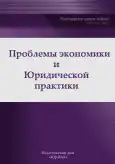The Doctrine of Good Morals in Civil and Family Law: Some Aspects
- 作者: Hamidullina F.I.1
-
隶属关系:
- Kazan (Volga Region) Federal University
- 期: 卷 18, 编号 5 (2022)
- 页面: 121-127
- 栏目: Articles
- URL: https://journals.eco-vector.com/2541-8025/article/view/546079
- ID: 546079
如何引用文章
详细
The purpose of the study. The article examines various aspects of the civil law doctrine of good morals, and explores the possibility of applying the category of «good morals» to family legal relations. Examples from the judicial practice of German courts related to the application of the category «good morals» are analyzed. Conclusions. The conclusion is substantiated that the civil law category «good morals» can be applied to family legal relations, in particular when considering claims for invalidation of marriage on the grounds of its fictitiousness, when challenging marriage contracts, when considering cases for the recovery of alimony, when challenging the agreements of spouses. In family law, as in civil law, the content of the category of «good morals» is determined based on the ideas of morality and morality existing in the state. Good morals act as the limits of the autonomy of family relations, allowing to invalidate family agreements that violate ideas about decency, morality, family values, family functions, and the ideals of marital and child-parent relationships supported in society. For the application of «good morals» in family relations, an objective criterion is necessary-the inconsistency of the concluded agreement or action with the system of morality and values, as well as a subjective one, which, depending on the circumstances of the case, may consist both in the intent of both parties or one party (for example, in the fictitious marriage), and in the awareness of the circumstances of the concluded agreement or committed actions (for example, when challenging a marriage contract). In addition, good morals and the contradiction of morality act as criteria and factors affecting the discretion of the law enforcement officer.
作者简介
Farida Hamidullina
Kazan (Volga Region) Federal University
Email: inbox7575@inbox.ru
Dr. Sci. (Law), Associate Professor, Professor of the Department of Civil Law, Advisor to the Rector Kazan, Russian Federation
参考
- Malyshkin A.V. Application of non-legal norms by courts (based on the materials of a sociological study) // Russian judge. 2018. No. 4. pp. 8-13.
- Savatier R. Theory of obligations. Legal and economic essay. M.: Progress, 1974. 440 p.
- Fedchuk D.V. Transactions contrary to public order and good morals in the law of foreign states in private international law // Society and Law. 2010. No. 3. pp. 102-107.
- Khuzhokova I.M. The doctrine of good morals and public order in contract law: a comparative study. M., Norm, Infra-M, 2011. 112 p.
- Shevtsov S.G. Good morals as a margin of discretion // Lawyer. 2013. No. 7. pp. 6-8.
- Schennikova L.V. Good morals as a category of civil law // Notary Bulletin. 2012. No. 3. pp. 56-62.
- Schennikova L.V., Bykova M.O. The category of «good morals» in civil legislation and civil doctrine of foreign countries // Bulletin of Perm University. Legal sciences. 2011. No. 2 (12). pp. 153-160.
- Ennekcerus L. Course of civil law. Translated from the German. Vol. 1: Half volume 2. Introduction and general part. M., 1950. 483 p.
- Yakushev, P.A. Traditional values in the mechanism of legal regulation of family relations in Russia and European countries: dis. ...Dr. yurid. sciences': 12.00.03 / Pavel Alekseevich Yakushev. Kazan, 2021. 572 p.
补充文件








